OPINION: The Babil Khan Case & Does It Open a Can of Worms?
Contextually speaking, Babil’s openness has long existed as a double-edged sword. It’s a trait both luminous and lacerating, charming and challenging.
Published: Monday,May 05, 2025 08:58 AM GMT-06:00
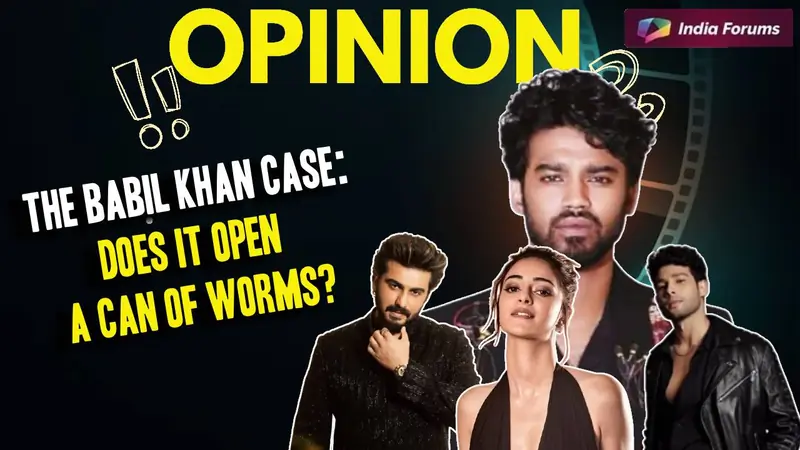
You wouldn’t quite be privy, not unless you’ve been tracking the ever-volatile tremors of the Hindi entertainment sphere with an ear pressed firmly against its inner walls, to what recently transpired with one of its most promising and, dare I say, widely adored budding actors: the disarmingly raw, the ineffably honest, the inimitable Babil Khan.
Breaking down in front of a camera is, more often than not, just that — a breakdown for the camera. A performance. A scene. A moment cinematically engineered for dramatic impact or performative emotion. But this? This wasn’t that. What unfolded recently with Babil wasn’t a contrived collapse curated for a reel or a still from an overwrought indie film. No. It was something far more unvarnished. Far more human.
For those who haven’t yet caught up, or perhaps were too quick to scroll past what should have stopped them cold, Babil was seen on Instagram, not merely crying but bawling. Not a solitary tear rolling delicately down a chiselled cheek, not the kind of melancholia a camera loves, but a full-bodied, soul-spilling sob. It was the kind of cry that collapses speech, throttles articulation, and renders a person almost unintelligible. And in the cascade of emotionally charged Instagram stories that followed, what poured out wasn’t a carefully worded statement, but the raw, unfiltered grief of a young man visibly bruised by his reality. He spoke of Bollywood being the “fakest industry I have been a part of,” lamented how “people in the industry are so rude,” and capped it off with the stark, jarring: “Bollywood is screwed.”

And then came the names. Ah yes, the names.
Ananya Panday. Shanaya Kapoor. Adarsh Gourav. Siddhant Chaturvedi. Arjun Kapoor. Arijit Singh. Names that, by sheer weight of fame and following, sparked a media frenzy faster than you could say “cancel culture.” The virtual ether combusted. Speculation swelled like a storm surge. Was he pointing fingers? Was this a digital unraveling or a masked exposé? Were these people, a few of them golden children of the glossy machine, complicit in whatever emotional rupture had brought him to this point?
Cue the expected choreography: a swift PR response. But not, interestingly, from Babil himself. The voice of reason, this time, was his mother, the erudite Sutapa Sikdar. In a calm, eloquent, and meticulously articulated statement, she clarified that the aforementioned names were not adversaries but, quite the opposite, people Babil admired, respected, and believed had significantly shaped the artistic and cultural tapestry of the industry. She attributed his outburst to what she called a “difficult day,” one of those universally recognizable moments of emotional overwhelm that broke through in a public, very digital way.
Babil Khan is not, by any means, the factory-minted, media-trained prototype of a Bollywood star. He is not sanded down. He is not sheen without substance. There’s a grain to him, a textural honesty, a lack of polish, that is both his greatest strength and, perhaps, his most glaring vulnerability
-

And then came the redemptive arc, a moment of digital grace. Babil returned to Instagram after a brief disappearance and, with characteristic humility, offered his own clarification: the name-dropping had been wildly misinterpreted, lifted out of context, twisted into something he had never intended. What followed was unexpected — a show of solidarity from the very corners of the industry presumed to be under fire. Ananya Panday, Siddhant Chaturvedi, Adarsh Gourav, and Raghav Juyal among others, rallied behind him. They issued messages of support, of empathy, of “we’ve got your back,” proving that beneath the sequinned surface of Bollywood, there may still be pockets of heart.
But this saga, as these things inevitably are, isn’t a one-note story. It is, if anything, a prism. Look at it from one angle and it’s a mental health crisis laid bare. From another, it’s a masterclass in PR triage. And yet from another, it’s a sobering reminder that even in 2025, emotional transparency in men — especially famous men — continues to startle, unsettle, and confuse the public consciousness.
Contextually speaking, Babil’s openness has long existed as a double-edged sword. It’s a trait both luminous and lacerating, charming and challenging. One moment, he’s vulnerably poetic, the next, strikingly observant, and occasionally, just blunt to the point of social discomfort. He is not, by any means, the factory-minted, media-trained prototype of a Bollywood star. He is not sanded down. He is not sheen without substance. There’s a grain to him, a textural honesty, a lack of polish, that is both his greatest strength and, perhaps, his most glaring vulnerability
Babil Khan may have had a really bad day. But in choosing to share that darkness, even clumsily, even confusingly, he reminded us that courage doesn’t always look like stoic silence or eloquent speeches. Sometimes, it looks like crying into a camera with nothing but your cracked voice and trembling truth to offer.
-

But then again, how could he be anything else? He is, after all, the son of the late Irrfan Khan, a man whose very being was a rebellion against the artificial. Irrfan embodied nuance, silence, depth — traits that don’t always translate well in a world addicted to instant virality and performative perfection. Babil, for all his inherited artistic inclination, hasn’t used that legacy as a shield or a stepping stool. If anything, he’s leaned into its weight with a kind of brave fragility that’s both rare and remarkable.
The entertainment industry, like every other deeply hierarchical, power-packed ecosystem, has its saints and sinners. There are those who champion authenticity and those who weaponise charm. Many of today’s rising stars, for all their visual perfection and social media prowess, are ultimately products of a slick machine, a machine designed to package, position, and protect. These young talents are reared in the wisdom of image management, PR protocols, and emotional calibration. They are tutored in damage control before they ever learn to fully understand their own internal chaos.
In contrast, Babil’s response — or rather, the lack of one, until it was refracted through his mother’s protective lens — reminds us that not every meltdown is a PR crisis. Some are just… meltdowns. And while Sutapa’s statement gave the narrative a much-needed sense of closure, or at least calm, it also inadvertently glossed over the raw heart of the matter. Because beneath the clarifications, the reposts, and the reconstructions lies something profoundly uncomfortable — the ache of a young man grappling with the relentless noise of an industry that does not always know how to listen.

There’s an odd discomfort, almost an allergic reaction, to watching our favorites fall apart. We expect our idols to glisten, not grieve. Their breakdowns must be aesthetic, poetic, palatable. What Babil offered instead was the truth. Jagged, unfiltered, and, most importantly, inconvenient. And in doing so, he cracked open a conversation that refuses to be neatly boxed and shelved.
This is about mental health. But not just in the hashtaggy, algorithm-friendly way. This is about the gritty, un-pretty reality of it. The kind that doesn’t trend. The kind that creeps in quietly. That lingers. That isolates. And most critically, the kind that gets dismissed when expressed by men — especially men in the spotlight.
And yes, this may well open a can of worms. But not the scandal-laced, tea-spilling, clickbait-generating kind. This opens a different kind of can — the emotionally neglected kind. The kind where too many are too quick to label and too slow to understand. Where vulnerability is mistaken for weakness, and outcry for attention-seeking. Where, despite all our awareness drives and wellness campaigns, emotional honesty is still seen as a risk, not a right.

One hopes, with ferocity and faith, that Babil is okay. That he is surrounded by people, not just handlers and colleagues, but people, who allow him to be all versions of himself without judgement. People who won’t reduce his complexity to convenience. People who will listen, really, deeply listen, when he speaks, and even more so when he can’t.
Because ultimately, what happened here is not a scandal. It is a mirror. Held up not just to the industry, but to us — the audience, the fans, the observers. Are we ready to witness our icons in pain without needing to fix, spin, or sensationalise it? Are we capable of sitting with someone else’s discomfort without rushing to decode or dismiss it?
Babil Khan may have had a really bad day. But in choosing to share that darkness, even clumsily, even confusingly, he reminded us that courage doesn’t always look like stoic silence or eloquent speeches. Sometimes, it looks like crying into a camera with nothing but your cracked voice and trembling truth to offer.
And that, in today’s world, is the kind of bravery that deserves not just our attention, but our respect.
Join Our WhatsApp Channel
Stay updated with the latest news, gossip, and hot discussions. Be a part of our WhatsApp family now!
Join NowYour reaction
 Nice
Nice Great
Great Loved
Loved LOL
LOL OMG
OMG Cry
Cry Fail
Fail

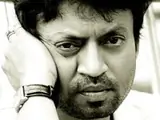








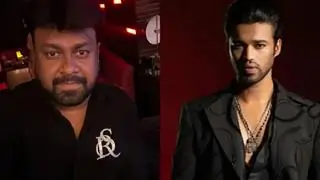
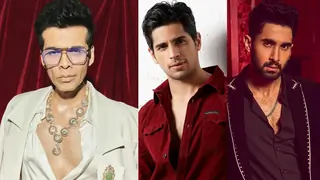
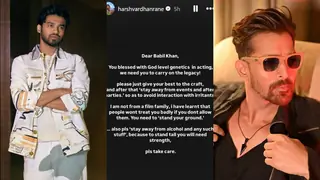
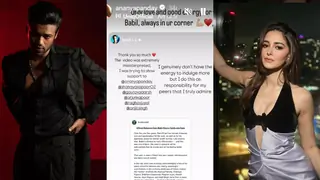
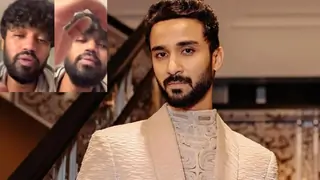









1 Comment